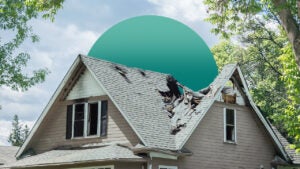What is a flood elevation certificate?




Navigating the complexities of flood insurance is often challenging, especially for homeowners in flood-prone areas where premiums may be steep. However, gaining insight into your property’s flood risk can be empowering. Enter the flood elevation certificate. If you’re wondering what an elevation certificate is, it’s a document that holds crucial information about your property’s elevation in relation to flood zones and helps you understand your risk profile. With this knowledge, homeowners can make informed decisions about mitigating flood risks and potentially reduce their insurance premiums.
What are flood elevation certificates?
The Federal Emergency Management Agency (FEMA) developed the flood elevation certificate process. It is overseen by the National Flood Insurance Program (NFIP). An NFIP flood elevation certificate provides specific property elevation information and may be especially beneficial for homeowners in high-risk flood zones. Although the primary purpose of an elevation certificate is to ensure compliance with community floodplain regulations, it may also be used to help determine — and even re-evaluate — your home’s flood risk.
Elevation certificates assess the risk of future flood damage by examining your home’s:
- First floor height
- Build
- Flood zone
- Location
With these details documented, the NFIP can better evaluate how high up your home is compared to how high floodwaters may reach in your area. This helps FEMA, along with financial institutions like mortgage companies, determine your home’s level of risk. Flood insurance companies then use your specific risk level to determine your premium.
You can purchase flood insurance through the government-backed NFIP or through a private provider. NFIP policies are capped at $250,000 for your home’s physical structure and $100,000 for your personal belongings. If you need higher coverage limits, you may want to shop around for quotes from private insurers. Private flood insurance companies typically do not require elevation certificates; however, getting one could provide a clearer picture of your property’s flood risk.
Elevation certificates and policy discounts
Homeowners may also use elevation certificates for flood insurance discounts. If the certificate proves that the property is at lower risk for flood damage than the premium initially reflected, or if the homeowner has taken action to mitigate risk based on the information provided in their property’s elevation certificate, their flood insurance premium might be lowered.
When do you need an elevation certificate?
Elevation certificates are not required to purchase flood insurance under FEMA’s Risk Rating 2.0 system. However, homeowners can choose to provide one to their agent to see if they qualify for a premium reduction based on the information in it. Here are some cases where an elevation certificate may be worth it:
- Your home is located in a historic floodplain. If the area where your home is located has flooded multiple times in the past 100 years, getting an elevation certificate could help you determine risk mitigation strategies.
- You are buying an NFIP policy. If you purchase flood insurance through the NFIP, providing an elevation certificate may help you lower your premium.
- The federal government is involved. If your home loan is going to be insured or issued by the U.S. government, an elevation certificate may be required for the loan to be approved.
- Your lender requires flood insurance. Your mortgage lender may require you to purchase flood insurance if your home is in a flood plain. In this instance, an elevation certificate might be useful in a few ways. If you do not believe your home needs flood insurance, an elevation certificate could help back up your claim. After you get the certificate, you can submit a request to get a Letter of Map Amendment (LOMA), which may allow you to bypass your lender’s flood insurance requirement by removing your home from a FEMA-designated flood zone. If your home is significantly elevated, you may still need flood insurance, but an elevation certificate could drastically reduce your premium.
- You completed a major home renovation. Renovations like home additions or basement remodels could change the lowest elevation point of your home. After completing the project, consider getting a new elevation certificate to see if the renovation altered your flood risk.
If you are unsure if you should get an elevation certificate, talk to your mortgage lender or insurance agent. Your agent may also be able to clarify if an elevation certificate could lower your flood insurance premium.
How to get an elevation certificate
Each state has a floodplain manager who will likely be able to help you if you are wondering how to get an elevation certificate. You can contact your state’s floodplain manager and ask if your home already has an elevation certificate. If you are purchasing a home, the sellers might also have a copy of a current certification.
However, if your home does not already have an elevation certificate and you need or want to obtain one, you have a few options. An engineer, a state-licensed surveyor or an architect should be able to examine your home and provide you with an elevation certificate. Just be sure that whoever you choose to hire is certified to provide their services for an elevation certificate; not everyone has the proper training to do so.
FEMA suggests homebuyers or homeowners check with their state’s professional association of land surveyors. There may be a surveyor close by who can assist you.
How much does an elevation certificate cost?
How much a flood elevation certificate is will depend on a few factors. Every individual engineer, surveyor and architect sets their own rates. Plus, factors like your home’s construction and its location could also affect your elevation certificate cost.
The following may also impact the price you pay:
- The building’s structural details: If you have a basement or crawlspace, these areas may need to be measured and accessed, which can be difficult depending on the home.
- The building’s location: If your home is difficult to access or somewhere with limited GPS functionality, your elevation certificate may be more expensive. Many tools that surveyors use rely on GPS data.
- The building’s occupancy type: If the property is used for commercial purposes, the cost of the certificate may increase significantly. This is because mechanical structures, such as elevators, require different measurements and considerations than a residential property.
- Your requested turnaround time: Elevation certificates require time and careful measurements. If you need a certificate quickly, it could put additional constraints on the surveyor, which can lead to higher costs.
Whether you are required to have an elevation certificate due to your federal loan or you are obtaining one willingly, knowing the details about the process can be helpful. Since homeowners insurance does not typically cover flood damage and a separate flood insurance policy is usually needed, insurance costs can add up quickly. An elevation certificate may help you to lower the cost of your flood insurance policy.
Frequently asked questions
Why we ask for feedback Your feedback helps us improve our content and services. It takes less than a minute to complete.
Your responses are anonymous and will only be used for improving our website.
You may also like

What is homeowners insurance and how does it work?

What is a moratorium in insurance?

Does homeowners insurance cover basement flooding?

